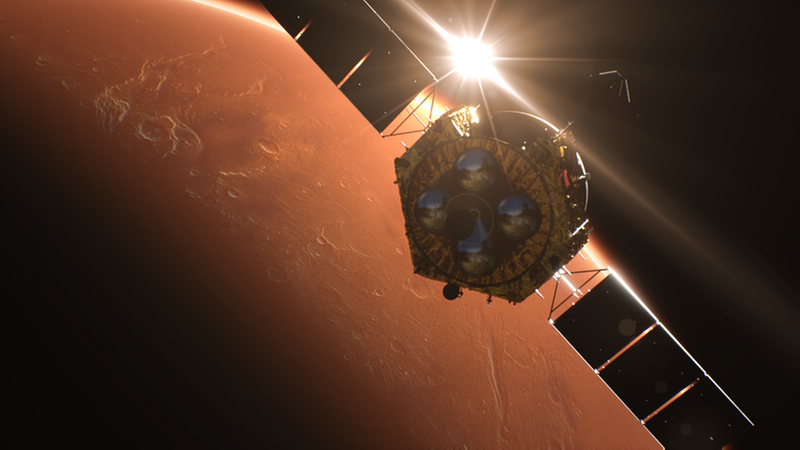Spirit of self-reliance boosts China's expedition to Mars and beyond

Illustration of Tianwen 1 probe entering Martian orbit. [Photo provided to China Daily]
China's Mars probe Tianwen-1 successfully landed on the surface of the red planet on Saturday, leaving a Chinese footprint on Mars for the first time.
The exciting landing has made China a new member among the world's pioneering Martian explorers. The spirt of self-reliance has played a key role in China's scientific development over the decades despite foreign attempts to block China's technological progress.
Exploring a planet some 55 million km away from Earth is extremely challenging. So far, around 50 Mars missions have been launched globally in humankind's saga to explore Mars since 1960. More than half of them have failed. With a late start, China launched Tianwen-1 last year, but the spacecraft is designed for a bold initiative: to complete orbiting, landing and roving in one single mission. This has never been done before.
China has now become the third country in history to touch down on Mars' surface following the United States and the former Soviet Union. The feat was not easily accomplished.
In the early days of the People's Republic of China, the country was a toddler in scientific and technological development. With the help of a wave of Chinese scientists returning to China from overseas, China has made its early breakthroughs in rocket and space technologies.
Through more than six decades of unremitting efforts, China has achieved one milestone after another in aerospace development, including manned space program, lunar exploration, and its BeiDou Navigation Satellite System.
A new giant leap was recorded in late April, as China sent into space the core module Tianhe of its space station, kicking off a series of launch missions that will complete the construction of the station around 2022.
While China is catching up in space exploration, and has grown from a follower to a trailblazer, it is facing even louder noise from some Western nations.
Following the launch of the Tianhe module, some media and scientists in the United States hyped up irresponsible theories about China's handling of the rocket debris. Their unfounded concerns reflect a fact that Washington is not happy to see China's fast leaps in space and technology, and sees in China a threat to its pursuit of space dominance.
However, such ill-intentioned and self-defeating disruptions will not hinder China's solid determination to move up the ladder in technological development, and promote international space cooperation.
China has always welcomed and participated in global cooperation on the peaceful use of outer space. During its Mars mission, China has worked with European partners and others. In March, it signed an accord with Russia on building an international lunar research station.
It is a common cause of the human race to find inspirations from the universe for solutions to daunting challenges threatening people's life on Earth. In this Odyssey, China, armed with enthusiasm, diligence and the readiness for cooperation, will help propel the humankind to travel faster and farther.